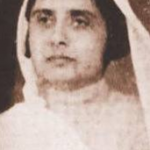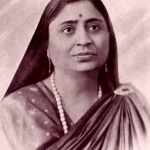One of the great ironies of the Rescue and Rehabilitation Operation that denied such subjectivity and agency to the abducted and already abused women of South Asia is that it was largely led (and certainly inspired) by female social workers. Many of these social workers were women who had been involved in the independence struggle in varying ways, and were accustomed to welfare-like programs such as this one. And as several have pointed out in their memoirs, diaries, and personal interviews, they could offer more than merely the “aid” of the Indian or Pakistani state, but the understanding and empathy of fellow women living in a world ruled by men. Below are listed just some of the incredible women who contributed their time, effort and emotional well-being to restore their abducted sisters to what most truly believed to be their rightful home.
- Mridula Sarabhai
Mridula Sarabhai is renowned as the founder and leader of the Rescue and Rehabilitation Operation. She was involved in the independence movement prior to Partition, and remained deeply interested in humanitarian and welfare efforts long after. This is especially true for the

Mridulaben Sarabhai, head social worker
plight of abducted women, in which Mridula took special interest. She wrote a 14-page letter to the constituent assembly of India arguing that the government was responsible for these women, and proposing the operation in much the same way as it came to be implemented. She is credited for the “success” of this operation, though she ultimately resigned, after which the number of women restored dropped precipitously.
- Rameshwari Nehru
Rameshwari Nehru was the Honorary Adviser to the Rescue and Rehabilitation Operation and the executive of the Women’s Section of the Ministry. She and Mridula often came to heads over certain issues concerning the restoration of women to their “correct” nation, Rameshwari

Rameshwari Nehru
advocating more caution in assigning nationality to women who may not desire that particular identity. She essentially wished that the tribunal take more care to listen to each abducted woman’s true wishes as to where she would rather live, regardless of where that home might be and if it was not what that tribunal preferred. She felt most strongly about this in regards to “illegitimate” children (children borne of the relations between abducted women and their abductors); she argued vehemently against separating restored women from their “illegitimate” children, an issue over which she eventually resigned.
- Kamla Patel
[see Working for the State]
- Begum Anis Kidwai
As a Muslim woman who chose an Indian nationality, Anis Kidwai provides a particularly interesting perspective on the restoration program. She also worked in Bengal, a region that has received relatively little scholarly attention compared to the Punjab. Her memoir, In The Shadow of Freedom, highlights the deplorable conditions found in Pakistani rescue camps in India.
- Manikuntala Sen
- Dayawati Kalra
- Durga Rani
- Krishna Thapar
- Gulab Pandit
- Nirmal Anand
